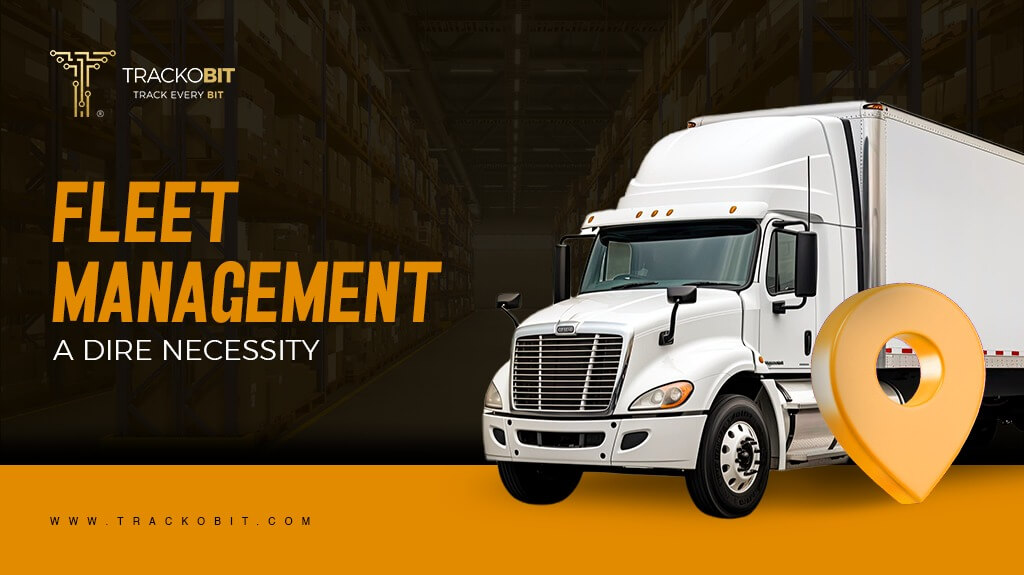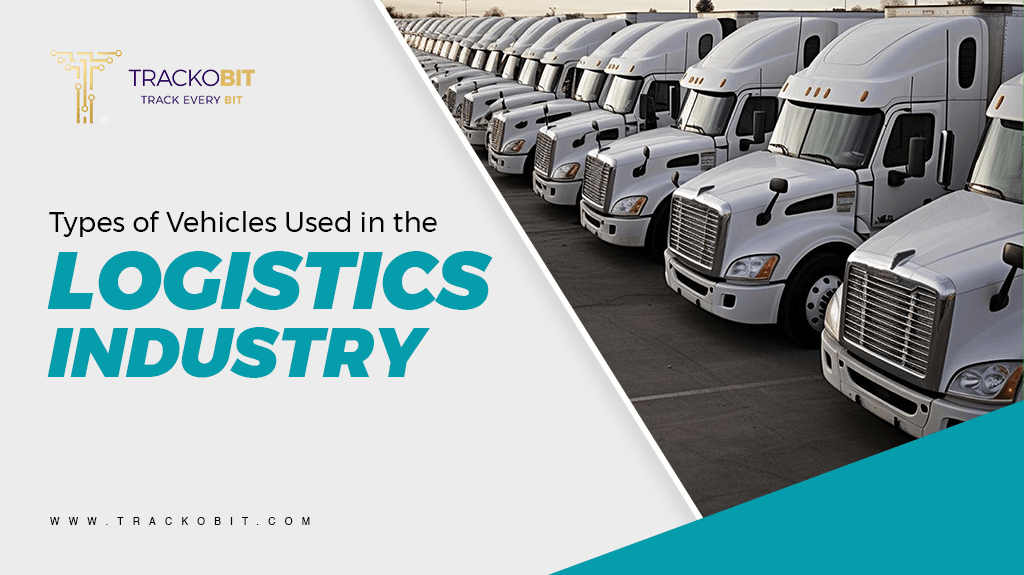-
TrackoBit
Manage commercial vehicles with the new-age Fleet Management Software
TrackoBit -
TrackoField
Streamline your scattered workforce with Field Force Management Software
TrackoField -
Features Resources
About Us
Get to know TrackoBit: our team, ethos, values, and vision.Careers
Join the most dynamic cult of coders, creatives and changemakers.Tech Support
Learn about our technical support team and services in detail.Events
Check out the exhibitions where we left our marks and conquered.
Contact Us
Connect with us and let us know how we can be of service.
What is Fleet Management? How It Works, Benefits & More
- Author:
- Read Time:10 min
- Published:
- Last Update: June 26, 2024
Categories
Table of Contents
ToggleCategories
- Video telematics
- TrackoField Industries
- Route Planning
- TrackoMile
- Driver Behaviour
- Last Mile Delivery
- Asset Tracking
- Dispatch Management
- Fuel Management
- Route Optimisation
- Electric Vehicle
- Roster Management
- Vehicle Tracking
- TrackoMile Industries
- TrackoBit Industries
- More
- Sensor Integration
- Topical
- GPS Trackers and Hardware
- Tech and Beyond
- TrackoField
- What's New
- Employee Management
- Company
- Field Sales And Service
- Telematics
- TrackoBit
- Task and Workflow
- Miscellaneous
- GPS Software
- Lead Management
- Fleet Management
- Leave And Attendance

If you want your fleet operations to be optimised, you need proper fleet management. And what better way to assist with this process than fleet management software?
Table of Contents
Toggle
Fleet management is a function for businesses and agencies that rely on transportation for their products or services. It is designed to ensure effective utilisation of assets, control costs, manage productivity, and reduce risks. Fleet management can drive valuable benefits for an organization, such as increasing efficiency in vehicle acquisition, fuel management, strengthening fleet compliance, increasing employee safety, and reducing carbon emissions.
That’s how important fleet management is. To enhance this process and make it more beneficial, 75% of fleet managers rely on fleet management software to support day-to-day operations. In this article, we have discussed the purpose, importance, and benefits of fleet management and how pairing it with telematics can have a resounding effect. Read to know every minute detail.
What is the Purpose of Fleet Management?
Fleet management is the process by which a company or organisation maintains the health of its fleet of vehicles, both now and in the future. Of course, this is a broad statement that includes a variety of managerial tasks. Nonetheless, the goal of fleet management is to maintain control over a company’s fleet of vehicles throughout its life.
Fleet operations and fleet management are involved in any organisation that depends on commercial vehicles for its daily operations. Fleet management’s goal is to supervise all fleet operations and maintenance in order to boost output and facilitate a company’s seamless operation.
Fleet management businesses frequently use vehicle telematics and fleet management software, such as TrackoBit, to boost fleet productivity and save operating expenses.
Why is Fleet Management Important?
Fleet management matters mainly because it can improve a fleet of vehicles’ overall operational efficiency. Efficiency is a phrase used by fleet managers since it refers to a variety of variables.
Fleet management is essential to corporate operations, regardless of the number of trucks—one or ten thousand. Monitoring the whereabouts and state of vehicles, together with maintenance plans and fuel usage, helps control expenses and prolong equipment life.
Continuous improvement is fleet management’s overarching goal. This has a number of objectives, such as tracking equipment and vehicles, raising safety, and monitoring the lifecycle of commercial vehicles. All this is done while reducing risk, increasing production, improving efficiency, and keeping the fleet in compliance with laws.

A fleet of vehicles that isn’t managed, or isn’t managed well, will likely experience some or all, of the following problems:
- Spiraling fleet operation expenses related to fuel consumption, overtime, and insurance.
- An increase in accidents, with damage to persons and property.
- Misuse of company assets, with no real-time visibility or asset tracking to monitor usage.
- Fines related to non-compliance and risk management become more difficult.
- Risky driving behavior or low driver retention.
- Disorganized or missed fleet maintenance of vehicles, uncontrolled maintenance costs, and no maintenance schedules.
- Lower standards of customer service and lack of route optimization, increasing delivery times and fuel usage.
- Poor resource utilisation, increased downtime, and a lower return on capital invested.
- Bad decisions related to vehicle acquisition or disposal.
- A lack of accurate reporting can make business forecasting impossible.
- With the large costs associated with running a fleet in today’s market, a good fleet manager can actually result in a positive return on investment, paying for themselves through savings in both operating costs and capital expenditure.
Fleet managers use fleet management software to automate tasks, which can relieve the administrative burden, improve reporting accuracy, and ensure critical events are not overlooked.
How Fleet Management Works?
Every company that owns or leases a fleet of vehicles follows much the same procedures regarding fleet management. In order to ensure seamless and effective operations, fleet management employs the following fundamental strategies:
Vehicle procurement: It is the procedure for allocating fleet assets through acquisition or leasing to suit a fleet’s unique requirements. Fleet managers must develop procurement strategies that complement both the overarching business objectives and their current fleet operations.
Monitoring fuel efficiency: Fuel is one of the biggest expenses for fleets, so managing it well is essential. Fleets must monitor vehicle idle, speeding, tire pressure, routing, and vehicle size, weight, and type to control fuel efficiency and cut expenses.
Addressing vehicle usage: This is the process of figuring out where your fleet trucks are, what they’re doing, who’s driving them, and when they’re being used. Also, it addresses why and how to run them more efficiently.
Managing driver behavior: Successful fleet operations depend on drivers adhering to your company’s policies. Your fleet may increase productivity by motivating drivers with coaching, rewards, performance indicators, and feedback.
Minimizing operational costs and risks: Fleets should evaluate the highest operational costs, such as crashes, overhead expenses, fines for non-compliance, and excessive fuel use, and seek to minimise them through fleet management protocols.
Reducing the total cost of ownership, enforcing driver safety regulations, lowering risk, and boosting productivity are all under constant pressure. As a result, fleet managers employ software, data analytics, and telematics technologies to assist them in overcoming the various commercial obstacles they encounter.
Benefits of Fleet Management

Total Cost Reduction
A cost-effective reduction in a fleet’s total cost of ownership (TCO) is one of the most alluring outcomes of effective fleet management, and there are several ways to do this. First, a fleet can reduce fuel expenses by using more efficient route planning; second, managers can save money over time by purchasing vehicles at the best prices; third, maintaining compliance means avoiding fines; and finally, routine maintenance keeps problems from worsening while postponing depreciation.
Driver Safety
Ensuring the safety of its drivers is a fundamental responsibility of every fleet management. Good fleet management supports this assignment by certifying each vehicle’s roadworthiness through regular inspections and dynamic maintenance schedules after completion. Moreover, a well-thought-out fleet management plan will improve the behavior of its drivers by teaching them safe driving techniques and how to handle collisions.
Productivity
Generally speaking, a fleet that is not productive cannot be efficient. Fleet productivity is the result of comparing the amount of miles traveled by drivers to the resources used. To put it simply, to identify areas for improvement and accomplishments, the former amount must exceed the latter. Fleet managers mostly accomplish this by using key performance indicator (KPI) research to produce actionable information. However, this can only be achieved by gathering relevant data.
Read Blog – Top 12 Fleet Management KPIs
Driver Retention
Maintaining a fleet’s current workforce while employing new drivers is crucial in an environment with prevalent driver shortages. Good fleet management creates strong trust between managers and their drivers, which helps retain drivers. This trust arises from the encouragement of safety and open communication—qualities that, through better working circumstances, encourage a happy mobile workforce.
Improving Efficiency
Fleet managers’ main duties include route planning and modification. By tracking routes and looking for possible routing problems, they can determine which routes require modification to enhance delivery times and adjust driver routes to balance workloads.
Assisting with Compliance
Laws and regulations in every place a fleet drives keep everyone informed, thanks to fleet management. The procedure helps avert possible problems such as drivers exceeding their legal driving time or failing to perform the necessary inspections while in transit.
What is a Fleet Manager Responsible For?
Fleet managers oversee both wider strategic movements and typical day-to-day operations, including:
Fuel Management
Fuel accounts for 25% of the average fleet’s expenditure, making it one of the largest costs involved with fleets of vehicles, barring electrified fleets. The simple fact is that it is so pricey.
Some market price fluctuations—like changes in oil prices—occur without fleet managers’ control. However, reducing a fleet’s fuel usage can help with this, and fleet managers can find various ways to reduce the cost of their fuel—as long as they get the correct guidance.
Vehicle Acquisition
For fleet managers, obtaining the vehicles that make up a specific fleet is a heavy obligation in and of itself. This is due to the possibility of financial damages from making the incorrect decision.
It is naturally challenging. A huge selection of vehicles is available, and many factors, such as possible resale value, insurance costs, and tax, can affect a person’s decision to finance or lease a car. A fleet manager is responsible for allocating funds effectively, determining appropriate vehicles, and making deals with automakers.
Vehicle Maintenance
Once automobiles are acquired, they must be maintained. This calls for putting together a vehicle maintenance schedule.
Fleet vehicles will inevitably develop physical deterioration, flaws, and component problems over time. Thus, fleet managers must ensure that every vehicle is inspected before purchase and routinely inspected thereafter.
Vehicle Tracking
If a fleet manager cannot consistently and accurately locate their vehicles’ positions, many issues will inadvertently arise. This is due to the absence of real-time vehicle tracking, which causes driver detouring, consequently leading to safety and efficiency rifts. For instance, it will imply a higher fuel consumption rate.
Additionally, fleet managers without asset tracking can’t send delivery updates and ETAs to clients nor generate mileage logbooks detailing route history to discern optimal journeys considering traffic disruption. Whether a fleet is small or large, vehicle tracking is one of the big challenges for fleet managers, and this is why they resort to GPS navigation technology for improved visibility.
Compliance
Fleet managers have legal obligations in addition to aspects of fleet management that are deemed best practices to fulfill. More specifically, all fleets must adhere to a set of on-road criteria.
Complying with regulatory standards entails regularly conducting vehicle checks, managing driver hours, confirming thorough technical inspections, ensuring insurance validity, staying current on laws, and organizing relevant documentation.
Compliance is essential, especially after an incident, to enable a precise audit if a complaint or inquiry is made later. Companies that neglect to keep their fleet compliant may face steep fines, litigation, and irreversible harm to their brand.
Read Blog – The Top 7 Fleet Management Challenges
The Role of Telematics in Fleet Management
Telematics technology is commonly integrated into fleets via vehicle on-board diagnostic (OBD) ports to provide data into software platforms. Access to telemetry data can encourage safer, more eco-friendly driver behavior and influence compliance with fleet policies. In addition, telematics systems can:
- Improve customer service through the use of real-time GPS monitoring, trip reporting and routing.
- Provides in-car driver coaching, risk and driver behavior reporting, crash notifications, reconstruction, and location tracking for missing or stolen vehicles or equipment.
- Use predictive maintenance and remote diagnostics to streamline maintenance and remote diagnostics.
- It will help monitor idling and other driving habits for fuel management.
- Simplify fleet compliance with easy tools for electronic logging, Hours of Service (HOS), and driver vehicle inspection reporting (DVIR).
- Integrate with other software systems, such as onboard camera technology or CRM software, and even create new applications.
- Manage electric vehicles (EVs) while reducing a fleet’s environmental impact and carbon emissions.

Why Businesses Should Use TrackoBit’s Fleet Management Software?
TrackoBit’s fleet management software has numerous advantages, including enhanced driver behavior, cost analysis, and real-time fleet location and performance visibility. In addition to providing location tracking, the advanced fleet management software also provides insight into vehicle efficiency and performance and presents data easily and comprehensibly for organizations.
TrackoBit can help you obtain unbiased data on driver safety by highlighting risky behaviors like speeding or hard braking and identifying drivers who require more coaching. It will help you maintain fleet compliance with federal and state laws, especially regarding DVIR and ELD, is also essential.
Creative – AD
With technology’s support for proactive maintenance initiatives, fleet managers may make the most of their assets by implementing preventative maintenance schedules. Additionally, many firms can use TrackoBit’s driver app, allowing fast data transfer and accessibility. By doing this, they can swiftly uncover concerns that could have gone unnoticed or developed into worse problems.
So, what are you waiting for, get yourself a free demo today!
Tithi Agarwal
Tithi Agarwal is a content writer at TrackoBit. She enjoys writing blogs which are knowledgeable yet fun to read. And when she is not typing away to glory she has her nose buried in books.
Related Blog Test
-

Tips to Build a Solid Fleet Management Strategy (Beware! It Works)
Nandita Gupta 29 August 2024Running a fleet without strategizing? You are doing it all wrong. Here, note down just 9 ways to form a spectacular fleet management strategy.
-

What is a Digital Tachograph? History, How to Use It & Alternatives
Anvesha Pandey 23 August 2024Read a lot of pieces around digital tachographs? Still not clear with what exactly is this? This piece is for you as it unfolds everything about tachographs.
-

What are DTC Codes? Types & How to Decode Them
Tithi Agarwal 20 August 2024Do you see a blinking check engine light but don’t know what it means or the reason? In this blog, we will learn why deciphering DTC codes is crucial for identifying the issue.
-

Types of Vehicles Used in the Logistics Industry
Nandita Gupta 16 August 2024There are almost 5 types of vehicles used in the logistics industry and you are using just one kind? Explore all the types of trucks and multimodal transportation used to ensure on-time dispatch and delivery of goods.
Thank you for reaching out! We'll speak to you soon.
In the meantime, why not find out more about us, explore our products, or visit our blog?
Stay Updated on tech, telematics and mobility. Don't miss out on the latest in the industry.
Cookie Consent
We use cookies to enhance and personalize your browsing experience. By continuing to use our website, you agree to our Privacy Policy.































